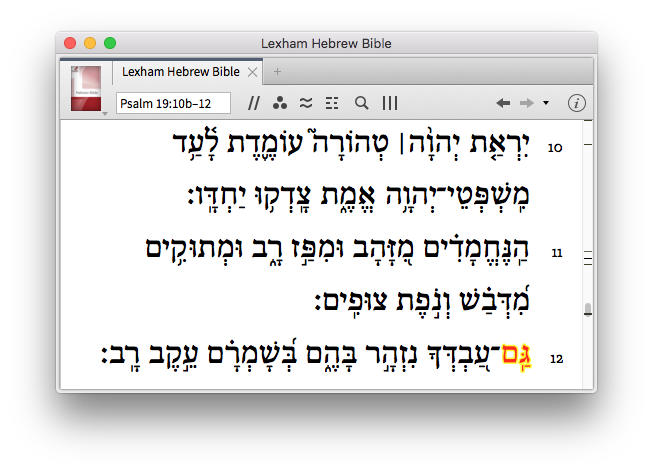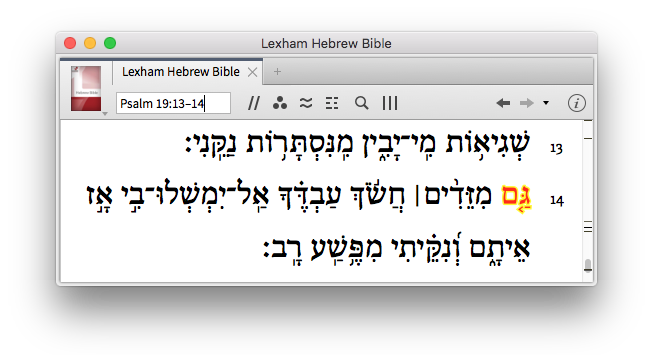
This post is by Josh Westbury, a scholar-in-residence at Faithlife.
Instructions are a vital part of everyday life. Imagine driving to a new place without directions, or baking an intricate dessert without a recipe, or—heaven forbid—having to put together a piece of Ikea furniture without a picture-by-picture guide telling you how each part fits together. Sure these feats are possible, but instructions make them much more manageable.
Like driving, baking, and assembling furniture, instructions play a crucial role in language as well. When we speak or write, we are constantly providing linguistic cues that help our addressees—the people to whom we speak—understand precisely what we are trying to communicate. One of the most common cues we use are called connectives. Connectives are words or phrases that typically occur at the beginning of a clause and provide instructions for the addressee on how to relate one or more clauses to another clause (or set of clauses). Take a look at the following examples:
(a) John was wealthy. He invested in tech companies.
(b) John was wealthy because he invested in tech companies.
Notice how when we read example (a) we infer a relationship (most likely a causal one) between John’s wealth and his investment in tech companies. Yet, there is nothing in either sentence that tells us this. In other words, the relationship is left implicit; we must infer it from context. In (b), however, the connective because provides the reader with explicit instruction for how these sentences should be related. Connectives allow us to ensure our intended message is received, by mitigating the potential for misunderstanding. Indeed, it often happens that an unintended relationship may be inferred if a connective is not used. Consider the difference between (a) and (c):
(a) John was wealthy. He invested in tech companies.
(c) Although John was wealthy, he invested in tech companies.
While it may be natural to infer a causal relationship in (a) where no connective is used, the connective although in example (c) instructs the reader to understand a concessive relationship instead—i.e., John invested in tech companies despite being wealthy.
Connectives in Hebrew
Connectives also play an important role in Biblical Hebrew. One of the most interesting Hebrew connectives is גַּם, often translated also, moreover, or even. According to A Biblical Hebrew Reference Grammar, גַּם is used to express a variety of relationships. But the two most common uses are: 1) neutral addition and 2) noteworthy addition. You will distinguish these two uses not via some exacting, algebraic methodology but by attentiveness to context. By helping you name what you see, these two labels will help you see more clearly.
In Psalm 19, גַּם is used twice, first in v.12(11), where it signals noteworthy addition, and then again in v.14(13), where it signals neutral addition. Let’s look at each of these in turn:

In vv.10b–11(9b–10), the psalmist praises the attractiveness and worth of Yahweh’s judgments (מִֽשְׁפְּטֵי־יְהוָ֥ה). Then at the beginning of v.12(11), we encounter גַּם. Most English versions translate this גַּם with the English connectives moreover or indeed. But what is גַּם doing here? גַּם is used to signal that what follows in vv.12–13 adds an especially noteworthy piece of information to the description of the judgments of Yahweh in vv.10b–11. It’s as if the author is saying, “But there’s more …” at the beginning of v.12. In other words, the judgments of Yahweh are trustworthy and righteous (v.10b), precious and sweet (v.11), but even more than that, they are a source of discipline and reward (v.12).
When used to signal noteworthy addition, גַּם often governs an entire clause. That is, גַּם doesn’t just signal that one entity must be added to what precedes, but the entire clause must be added. In fact, in Hebrew poetry, גַּם may even connect multiple clauses to what precedes. This is what we see in v.12(v.11) for instance. גַּם connects both clauses in v.12 to the preceding description of the מִֽשְׁפְּטֵי־יְהוָ֥ה (“judgments of Yahweh”) in vv.9b–10.
Now let’s consider the use of גַּם in v.14:

Unlike in v.12, where גַּם highlights the significance of what follows (noteworthy addition), here גַּם conveys simple, or neutral addition. Moreover, where גַּם governs multiple clauses in v.12, here גַּם only governs the single phrase מִזֵּדִ֨ים (“from faults”). Furthermore, notice how the constituent מִזֵּדִ֨ים is fronted (placed before) the imperative verb חֲשֹׂ֬ךְ. We normally expect a prepositional phrase like מִזֵּדִ֨ים to occur after the verb in Biblical Hebrew. When גַּם precedes a word or phrase that occurs before an imperative (or any finite verb), it often only governs the fronted phrase, and typically signals neutral addition. In other words, גַּם indicates that an entity should be added to another previously stated entity as far as some state of affairs is concerned. This is essentially how the connective also functions in English. So for example, Mary brought pie to the party, and John also brought pie. The connective also indicates that John should be added to Mary with respect to the state of affairs bringing pie to the party. In fact, most of the time that גַּם is used to signal neutral addition it is translated also.
Returning to our example in Ps. 19, גַּם explicitly marks a tight connection between v.13b an v.14a that might have been missed had the connective not been used. In particular, גַּם signals that מִזֵּדִ֨ים (deliberate sins) in v.14a should be added to מִֽנִּסְתָּרֹ֥ות (unknown sins) in v.13b with respect to the psalmist’s desire to be free from sin. When understood together, these clauses form a powerful prayer for deliverance from all types of sin.
Understanding how Hebrew connectives work can enhance your teaching and preaching in countless ways. For other examples in which גַּם is used for both neutral and noteworthy addition, as well as a detailed analysis of several other types of Biblical Hebrew connectives, I highly recommend A Biblical Hebrew Reference Grammar.




Where are the charities John is contributing to? I don’t see any charities, only tech companies. Oh, maybe they’re not connected yet. Is that even possible?
Whoops! Fixed!
As usual, I learn from reading Josh Westbury’s posts; thank you! Unfortunately, as sometimes happens, there appear to be some problems in the execution of the posting. I call your attention to these problems so that they do not needlessly mar Josh’s message. The proofreader in me notes that in this case: (1) the discussion of example “a” refers to John’s “contribution to charity,” but the example does not mention that fact. (2) In the discussion of Ps. 19:13–14, the inserted Hebrew words are transposed between those two verses.
Thanks! Fixed!
Also, in the second to last paragraph of the article, the translation of מִֽנִּסְתָּרֹ֥ות should be (from unknown or hidden sins) while the translation of מִזֵּדִ֨ים should be (from deliberate or presumptive sins).
Fixed! Thanks!
Where does the translation of zediym = deliberate sins come from? Only because it seems to fit in this psalm? When I researched this word a few years ago, I found that every other instance of this word in the OT denotes a person, someone who opposes God. Since there is no known etymology of the word, it seems more logical to translate something like ‘the arrogant’ or ‘evildoers’.
In our world, we can sometimes think that our own sin is the only problem in our lives. I think the psalmist shows us a bigger picture. It’s not just me, myself and I before God. We are constantly threatened – and they were much more so in the world of the psalmist – in this dog-eat-dog world. We are threatened by human predators who seek to destroy us or our children. Pimps, drugdealers, teenage gangs seeking to press our children into bondage; gun-toting terrorists, policemen, and mentally deranged people taking lives; robbers and phishing scammers, litigants trying to make us bankrupt; adulterers and pornographers seeking to destroy our marriages; politicians leading us into war under false pretences destabilising the whole world; evil dictators killing their own people in droves – you name it. Christians all over the world get murdered, put in prison or mob-lynched under false charges. At work people get set up to fall, or sent into dangers mines/ seas/ wars without the necessary safety equipment. I think the psalmist acknowledges that there is more to obeying the law of the Lord than just one’s own decisions. I think we can all identify a few instances of ‘there but for the grace of God’ – where we escaped human traps, getting killed or raped, or being dragged into sin by others. I certainly can. That’s what I think the psalmist is pointing to here.